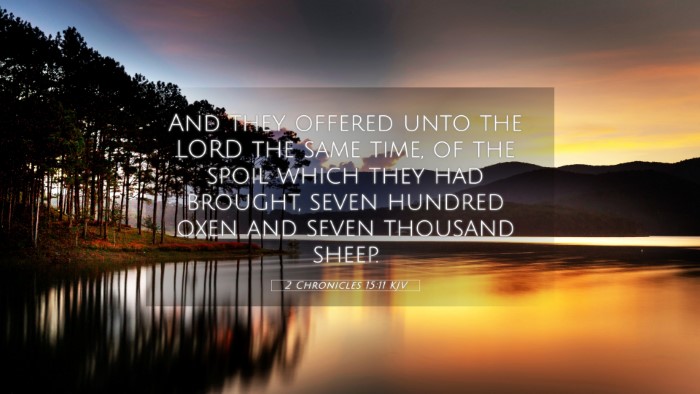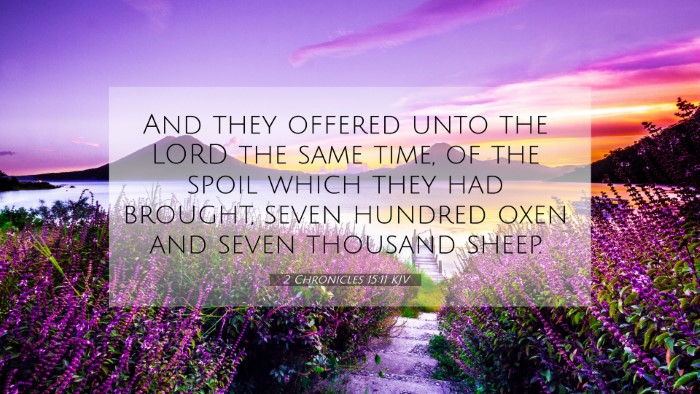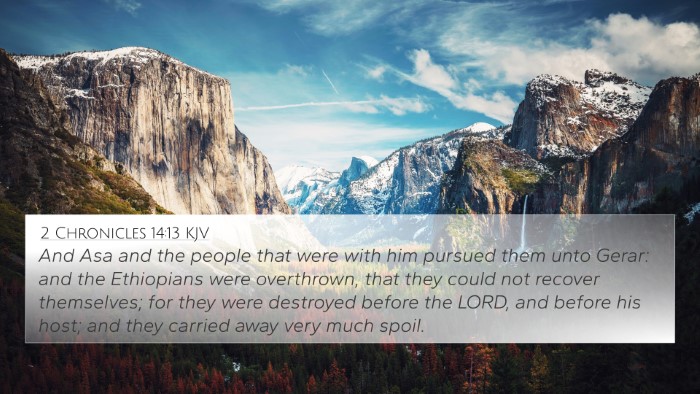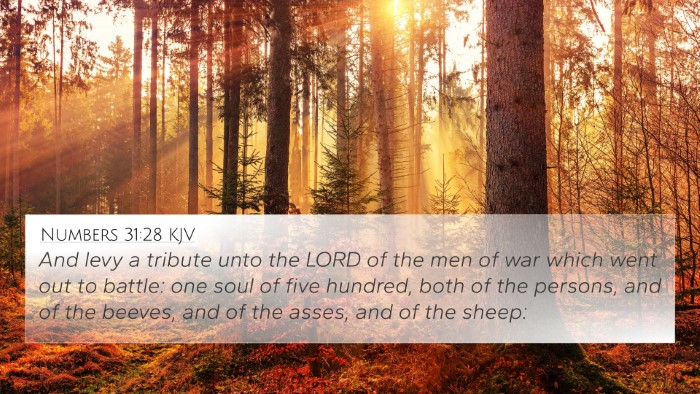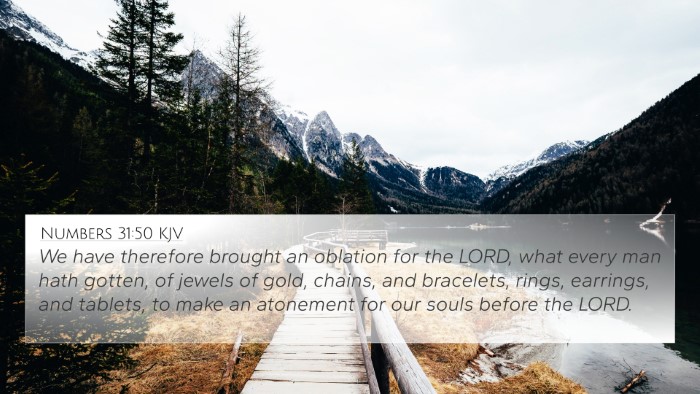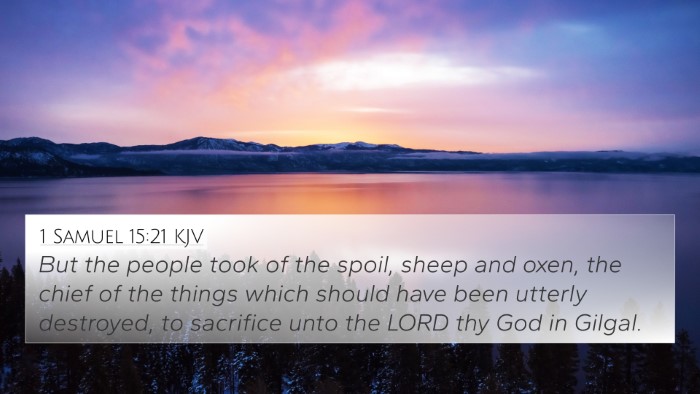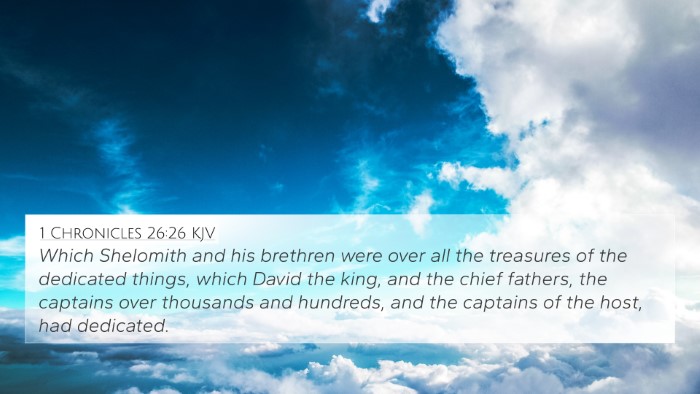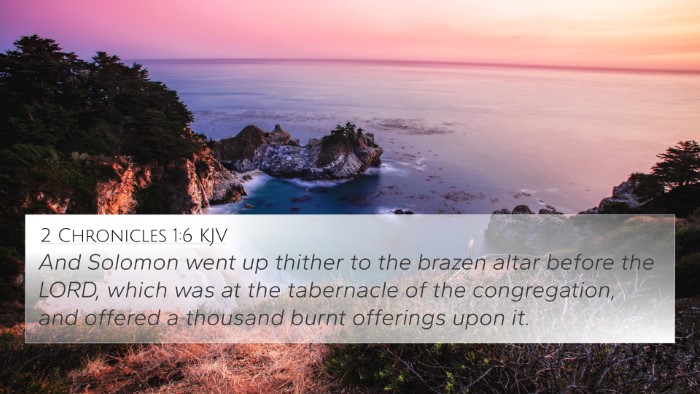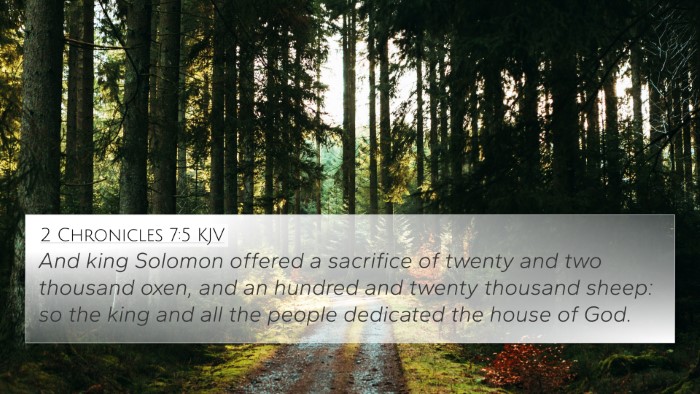Understanding 2 Chronicles 15:11
Verse: "And they offered unto the LORD the same time, of the spoil which they had brought, seven hundred oxen and seven thousand sheep."
In 2 Chronicles 15:11, we encounter a crucial moment in the life of Israel during King Asa's reign, emphasizing the theme of worship and acknowledgment of God's providence. This verse demonstrates the people's grateful response to God's assistance in their military victory over their enemies. The act of offering signifies recognition of God's sovereignty and the blessings He bestows upon His people.
Insights from Commentaries
The commentaries by Matthew Henry, Albert Barnes, and Adam Clarke provide rich insights regarding this verse. Each commentator sheds light on the spiritual significance and the implications for Israel's communal worship.
-
Matthew Henry: Henry emphasizes that the offerings made by the people were not only an expression of gratitude but also a re-affirmation of their covenant relationship with God. By bringing the spoils of their victory as offerings, they recognized God's role in granting them success and reminded themselves of the importance of worship in their national identity.
-
Albert Barnes: Barnes comments on the specific details of the offering, indicating the significance of the numbers, representing completeness. The seven hundred oxen and seven thousand sheep symbolize the fullness of their gratitude—a large offering reflecting their recognition of God's blessings. This act of sacrifice involved a communal participation that forged stronger bonds among the people.
-
Adam Clarke: Clarke notes the historical context and the unity of the people in their worship. He highlights the importance of public offerings and how they serve as a witness to God's glory and mercy. The offerings serve as a reminder of both their dependence on God in times of need and their commitment to honor Him during times of triumph.
Thematic Connections and Cross-References
This verse connects deeply with various themes found throughout the Bible, particularly the importance of worship, community, and the acknowledgment of God's providence. Here are 10 Bible cross-references that relate to 2 Chronicles 15:11:
- 1 Chronicles 16:29: "Give unto the LORD the glory due unto his name: bring an offering, and come before him: worship the LORD in the beauty of holiness."
- 2 Kings 12:4-5: "And Jehoash said to the priests, All the money of the dedicated things that is brought into the house of the LORD, even the money of every one that passeth the account, the money that every man is set at..."
- Exodus 23:19: "The first of the firstfruits of thy land thou shalt bring into the house of the LORD thy God..."
- Psalm 116:12-14: "What shall I render unto the LORD for all his benefits toward me? I will take the cup of salvation, and call upon the name of the LORD."
- Malachi 3:10: "Bring ye all the tithes into the storehouse, that there may be meat in mine house..."
- Philippians 4:18: "But I have all, and abound: I am full, having received of Epaphroditus the things which were sent from you, an odour of a sweet smell, a sacrifice acceptable, wellpleasing to God."
- Hebrews 13:15: "By him therefore let us offer the sacrifice of praise to God continually, that is, the fruit of our lips giving thanks to his name."
- Matthew 5:23-24: "Therefore if thou bring thy gift to the altar, and there rememberest that thy brother hath ought against thee..."
- Deuteronomy 12:6: "And thither ye shall bring your burnt offerings, and your sacrifices, and your tithes..."
- Romans 12:1: "I beseech you therefore, brethren, by the mercies of God, that ye present your bodies a living sacrifice, holy, acceptable unto God..."
Conclusions and Practical Applications
The offerings made by King Asa and his people in 2 Chronicles 15:11 serve as a powerful reminder of the heart of worship. They teach us valuable lessons about gratitude, community participation in worship, and the recognition of God's blessings in our lives. As believers today, we can draw upon the lessons of this verse and its cross-references, learning to give thanks and to honor God with our lives and resources.
Understanding the connections between Bible verses enhances our spiritual insight and fosters deeper worship. Utilizing tools for Bible cross-referencing such as a concordance or Bible reference resources can greatly aid in this pursuit. Engaging in cross-referencing Bible study methods allows us to build a richer understanding of the Scriptures and to identify how various themes intertwine across both the Old and New Testaments.

